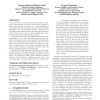Free Online Productivity Tools
i2Speak
i2Symbol
i2OCR
iTex2Img
iWeb2Print
iWeb2Shot
i2Type
iPdf2Split
iPdf2Merge
i2Bopomofo
i2Arabic
i2Style
i2Image
i2PDF
iLatex2Rtf
Sci2ools
115
click to vote
ATAL
2009
Springer
2009
Springer
Bounded rationality via recursion
Current trends in model construction in the field of agentbased computational economics base behavior of agents on either game theoretic procedures (e.g. belief learning, fictitious play, Bayesian learning) or are inspired by artificial intelligence (e.g. reinforcement learning). Evidence from experiments with human subjects puts the first approach in doubt, whereas the second one imposes significant computational and memory requirements on agents. In this paper, we introduce an efficient computational implementation of n-th order rationality using recursive simulation. An agent is n-th order rational if it determines its best response assuming that other agents are (n−1)-th order rational and zero-order agents behave according to a specified, non-strategic, rule. In recursive simulations, the simulated decision makers use simulation to inform their own decision making (search for best responses). Our goal is to provide agent modelers with an off-the-shelf implementation of n...
Artificial Intelligence | Artificial Intelligence | ATAL 2009 | N-th Order Rationality | Recursive Simulations |
Related Content
| Added | 26 May 2010 |
| Updated | 26 May 2010 |
| Type | Conference |
| Year | 2009 |
| Where | ATAL |
| Authors | Maciej Latek, Robert L. Axtell, Bogumil Kaminski |
Comments (0)

